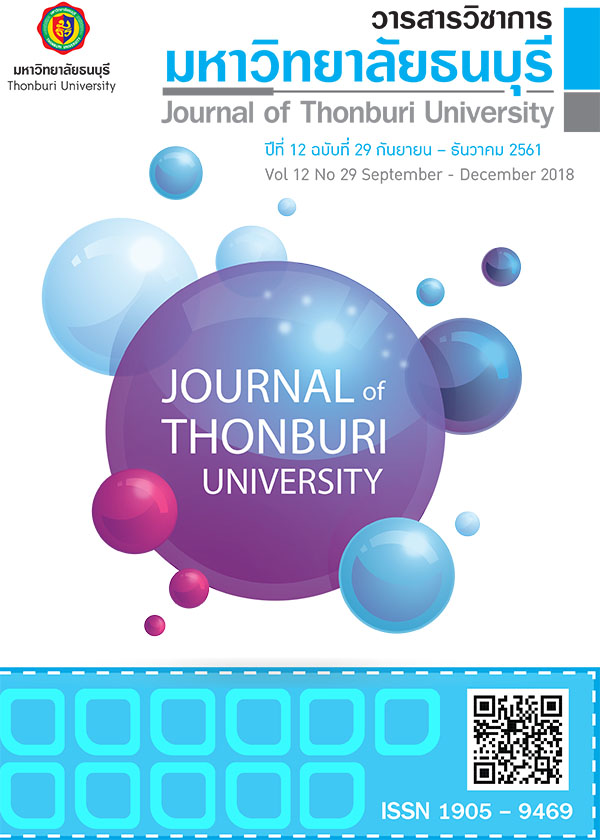การจัดการการเงินส่วนบุคคลกับความสุขด้านการเงินของบุคลากรมหาวิทยาลัยเทคโนโลยีราชมงคลศรีวิชัย
คำสำคัญ:
การเงินส่วนบุคคล, ความสุข, ความสุขด้านการเงินบทคัดย่อ
บทคัดย่อ
การวิจัยครั้งนี้มีวัตถุประสงค์ 1) เพื่อศึกษาการจัดการการเงินส่วนบุคคลของบุคลากรมหาวิทยาลัยเทคโนโลยีราชมงคลศรีวิชัย2) เพื่อศึกษาความสุขทางด้านการเงินของบุคลากร 3) เพื่อศึกษาความสัมพันธ์ระหว่างข้อมูลส่วนบุคคล กับการจัดการการเงินส่วนบุคคลและความสุขทางการเงิน และ 4) เพื่อความสัมพันธ์ระหว่างการจัดการการเงินส่วนบุคคล กับความสุขทางการเงิน กลุ่มตัวอย่างเป็นบุคลากรสังกัดมหาวิทยาลัยเทคโนโลยีราชมงคลศรีวิชัยใช้วิธีการสุ่มตัวอย่างแบบเทียบสัดส่วน จำนวน 400 ตัวอย่าง ระยะเวลาในการศึกษา 1 ปี คือระหว่าง มกราคม 2560 ถึง มกราคม 2561เครื่องมือที่ใช้วิจัยเป็นแบบสอบถาม สถิติที่ใช้คือ ค่าความถี่ ร้อยละ และค่าสถิติไคสแควร์ที่ระดับความเชื่อมั่น 0.05
ผลการวิจัยพบว่า 1) ประเภทบุคลากรและสถานภาพมีความสัมพันธ์กับการวางแผนการซื้อหรือครองสินทรัพย์ในปัจจุบันและการก่อหนี้ในอนาคต ประเภทบุคลากรมีความสัมพันธ์กับการซื้อหรือครอบครองสินทรัพย์ในอนาคตและระยะเวลาที่บรรลุเป้าหมายในการออมหรือการลงทุน สายงานของบุคคลากรมีความสัมพันธ์กับการมีหนี้สิน ระดับการศึกษามีความสัมพันธ์กับจำนวนเงินที่ผ่อนชำระหนี้สินแต่ละเดือน สถานภาพมีความสัมพันธ์กับในอนาคตคาดว่ามีแผนการก่อหนี้ส่วนสังกัดพื้นที่มีความสัมพันธ์กับรูปแบบการออมหรือการลงทุนในปัจจุบัน อายุและสังกัดพื้นที่มีความสัมพันธ์กับการออมหรือการลงทุนในอนาคต สถานภาพมีความสัมพันธ์กับรายการที่ใช้ลดหย่อนภาระภาษีในปัจจุบัน รายได้ต่อเดือนและผู้ที่อยู่ในการดูแลมีความสัมพันธ์กับร้อยละฐานภาษีปัจจุบัน เพศระดับการศึกษา รายได้ต่อเดือนมีความสัมพันธ์กับแผนการลดหย่อนภาษีในอนาคต อายุประเภทบุคลากรมีความสัมพันธ์กับแหล่งเงินออมเพื่อการเกษียณ และสังกัดพื้นที่มีความสัมพันธ์กับอัตราผลตอบแทนสำหรับเงินออมเพื่อการเกษียณ 2) ประเภทบุคลากรมีความสัมพันธ์กับการผ่อนชำระหนี้สินต่าง ๆ สถานภาพมีความสัมพันธ์กับกำหนดเวลาชำระหนี้ส่วนระดับการศึกษาสังกัดพื้นที่ สายงานของบุคคลากรมีความสัมพันธ์กับเงินออมในแต่ละเดือน ประเภทบุคลากรและสายงานของบุคคลากรมีความสัมพันธ์กับค่าตอบแทนที่ได้รับแต่ละเดือนเทียบกับรายจ่ายทั้งหมด 3) การวางแผนการซื้อหรือครองสินทรัพย์ในปัจจุบันและการมีหนี้สินมีความสัมพันธ์กับการผ่อนชำระหนี้สินต่าง ๆ การมีหนี้สินจำนวนเงินที่เก็บในอนาคตแหล่งเงินออมเพื่อการเกษียณมีความสัมพันธ์กับกำหนดเวลาชำระหนี้ การก่อหนี้ในอนาคตมีความสัมพันธ์กับเงินออมในแต่ละเดือน และการมีหนี้สินและจำนวนเงินที่คาดว่าจะเอาไว้ใช้จ่ายหลังเกษียณต่อเดือนมีความสัมพันธ์กับค่าตอบแทนที่ได้รับแต่ละเดือนเทียบกับรายจ่ายทั้งหมด
คำสำคัญ: การเงินส่วนบุคคล, ความสุข, ความสุขด้านการเงิน
เอกสารอ้างอิง
กรแก้ว ถิรพงษ์สวัสดิ์. (2556). Empowerment Evaluation:ความท้าทายของงานสาธารณสุข.วารสารศูนย์อนามัยที่ 7 ขอนแก่น. 5(1): 1-4.
กิจติพร สิทธิพันธุ์. (2553). ปัจจัยที่มีอิทธิพลต่อการวางแผนทางการส่วนบุคคลของประชาชนในกรุงเทพมหานคร. ปริญญาบริหารธุรกิจมหาบัณฑิตบัณฑิตวิทยาลัย มหาวิทยาลัยกรุงเทพ.
จันทร์เพ็ญ บุญฉาย. (2552). การจัดการการเงินส่วนบุคคล: กรณีศึกษาเฉพาะกลุ่มวัยทำงานในเขตกรุงเทพมหานคร.มหาวิทยาลัยธุรกิจบัณฑิตย์.
มนต์ทนา คงแก้ว และคณะ (2557). การบริหารการเงิน.คณะบริหารธุรกิจ:: มหาวิทยาลัยเทคโนโลยีราชมงคลศรีวิชัย.
มหาวิทยาลัยเทคโนโลยีราชมงคลศรีวิชัย. กองบริหารงานบุคคล. (2560). จำนวนบุคลากรสังกัดมหาวิทยาลัยเทคโนโลยีราชมงคลศรีวิชัย. สืบค้นเมื่อ 1 มกราคม 2560, จาก http://personnel.rmutsv.ac.th
ยุทธนา พงศกร. (2552). การบริหารเงินส่วนบุคคลของข้าราชการสังกัดกระทรวงศึกษาธิการในเขตเทศบาลนครสงขลา. กรุงเทพฯ: สำนักงานคณะกรรมการวิจัยแห่งชาติ.
ศิรินันท์ กิตติสุขสถิต. (2558). แนวคิด: คุณภาพชีวิต ความสุขและความสุขในการทำงาน.มหาวิทยาลัยมหิดล.
สำนักงานกองทุนสนับสนุนการสร้างเสริมสุขภาพ. (2559). Happy Workplace. กรุงเทพฯ: สำนักงาน สสส.
สุขใจ น้ำผุด; และ อนุชนาฎ เจริญจิตรกรรม. (2555). กลยุทธ์การบริหารการเงินบุคคล. ศูนย์หนังสือ ม.ธรรมศาสตร์.
อรอนงค์ ไซยบุญเรือง. (2552). การวางแผนการเงินส่วนบุคคลของพนักงานธนาคารกรุงไทย จำกัด (มหาชน) สาขาในอำเภอเมืองเชียงใหม่. เชียงใหม่: บัณฑิตวิทยาลัย มหาวิทยาลัยเชียงใหม่.
Translated Thai References
Boonchay, Janpen. (2009). Personal Finance Management: A case study of working age group in Bangkok. (in Thai)
Chaibunrueng, Ornanong. (2009). Personal financial planning of employees of Krung Thai Bank public company limited in Mueang Chiang Mai Branches: Chiangmai. Graduate School. Chiang Mai University. (in Thai)
Human Resources Management Division. (2017). Number of personnel in Rajamangala University of Technology Srivijaya. Retrieved on January 1, 2560. From http://personnel.rmutsv.ac.th (in Thai)
Kaoeian, Kamolporn. (2013). Factors influencing personal financial management of Chumphon provincial police. Master of Business Administration (M.B.A.): Walailak University. (in Thai)
Kittisuksatis, Sirinun. (2015). Concepts: Quality of life, happiness and happiness in work. Mahidol University. (in Thai)
KongKeaw, M.; & group. (2014). Faculty of Business Administration: Rajamangala University of Technology Srivijaya. (in Thai)
Nampood, S.;& Charoenjittakarm, A. (2012). Strategic personal finance management. Thammasart University Store. (in Thai)
Pongsakron Yuttana. (2009). Personal Money Management of Government Officials under the Ministry of Education in Songkhla Municipality. Bangkok: National Research Council of Thailand. (in Thai)
Sittipan, K.. (2010). Factors Effecting the Personal Financial Management of Personal in Bangkok area. Master of Business Administration (M.B.A.): Bangkok University. (in Thai)
Thai Health Promotion Foundation. (2016).Happy Workplace. Bangkok. Office of Thai Health Promotion Foundation.(in Thai).
Thirapongsawat, Kornkeaw. (2013). Empowerment Evaluation:The challenges of public health. Journal of regional health promotion centre 7 KhonkaenVolumn 5(1): 1-4. (in Thai).







